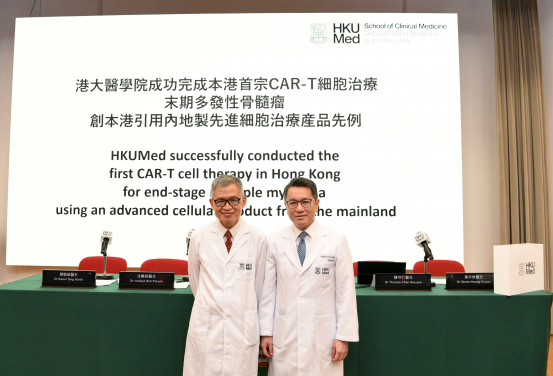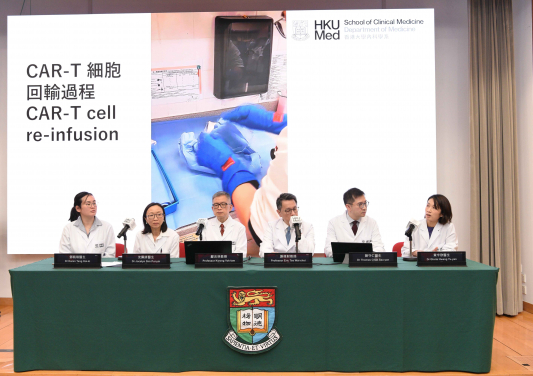Media
HKUMed successfully conducts the first CAR-T cell therapy in Hong Kong for end-stage multiple myeloma using an advanced cellular product from the mainland
26 Mar 2025
The research team, led by Professors Kwong Yok-lam (front right) and Eric Tse Wai-choi (front left), successfully utilises BCMA CAR-T cells from the mainland to cure multiple myeloma.

Professors Kwong Yok-lam (left) and Eric Tse Wai-choi state that the team will continue to seek and develop advanced clinical treatment techniques to benefit more patients in Hong Kong.
A clinical team from the Department of Medicine, School of Clinical Medicine at the LKS Faculty of Medicine of the University of Hong Kong (HKUMed), in collaboration with Queen Mary Hospital, has spearheaded the use of CAR-T cell therapy for blood cancers. The researchers recently treated the first myeloma patient with this therapy (patient case details in Appendix A), resulting in a very good response without severe complications. The expansion of this innovative treatment to myeloma patients offers new hope for those who have not responded to traditional treatment, marking a significant milestone in advancing healthcare in Hong Kong. Importantly, the treatment for these patients represents the first time advanced CAR-T cellular therapy manufactured in the mainland has been used in Hong Kong, opening new possibilities for the use of novel advanced cellular therapies from the mainland in Hong Kong and potentially benefitting a broader range of patients in the future.
Background
Myeloma is a cancerous disorder of plasma cells that occurs primarily in patients in their forties and fifties, though younger patients are also at risk. The disease causes anaemia, bone destruction and kidney damage, ultimately resulting in death.
The current standard of care for myeloma involves the use of frontline target agents, occasionally in combination with chemotherapy, followed by autologous haematopoietic stem cell transplantation. However, many patients still experience a disease relapse. For those who relapse or fail to respond to frontline treatment, options are limited, with only short-lived benefits from bispecific antibodies and other targeted drugs. For patients who relapse and do not respond to traditional therapies, the disease often becomes terminal.
CAR-T cells therapy is an innovative approach to help patients fight cancers with their own immune system. CAR-T cells are genetically engineered T-lymphocytes that express a chimeric antigen receptor targeting a specific antigen on cancer cells. In standard CAR-T cell therapy, these T-lymphocytes are derived from the patient (hence, autologous) and are now available for treating blood cancers, including leukaemia, lymphomas and myeloma.
Queen Mary Hospital was the first hospital in Hong Kong to offer CAR-T cell therapy in 2021. The clinical team has successfully performed CAR-T therapy on over 60 patients with various blood cancers, representing the largest cohort of CAR-T cell-treated patients in Hong Kong.
Research methods and findings
The treatment process begins with collecting T-lymphocytes from the patient’s peripheral blood, a process known as apheresis. These T-lymphocytes are then transported to a manufacturing site, where the CAR construct is inserted. While the genetically modified CAR-T cells are returned to the treatment site, the patient undergoes chemotherapy to clear circulating lymphocytes, a process known as lymphodepletion. Following the completion of lymphodepletion, the CAR-T cells are re-infused back to the patient.
The CAR-T cells used for myeloma target an antigen called B-cell maturation antigen (BCMA). The research team utilises BCMA CAR-T cells produced from a manufacturer in the mainland. This product has been in use since 2020 and received approval from the National Medical Products Administration in 2023. This is the first time this product has been used outside the mainland.
Significance of the treatment
‘Currently, Queen Mary Hospital is the only hospital in Hong Kong offering CAR-T cell immunotherapy for myeloma. The existing pilot CAR-T cell therapy programme aims to treat five to ten myeloma patients annually,’ said Professor Kwong Yok-lam, Chair Professor of the Department of Medicine, School of Clinical Medicine, HKUMed.
Professor Eric Tse Wai-choi, Associate Dean (Research) of the Faculty and Clinical Professor in the same Department, added, ‘BCMA CAR-T cell therapy will have a significant impact on myeloma management in Hong Kong, as it represents one of the most effective salvage strategies for myeloma. It can provide a life-saving option for patients who do not respond to standard therapy or experience a relapse after autologous bone marrow transplantation.’
The use of BCMA CAR-T cell therapy in these patients marks the first application of advanced clinical technology from the mainland in Hong Kong. It exemplifies how state-of-the-art therapeutic products and technology developed in the mainland can benefit patients in Hong Kong and paves the way for accessing more innovative treatment strategies from the mainland for use in Hong Kong.
About the research team
The research team includes Professor Kwong Yok-lam, Chair Professor; Professor Eric Tse Wai-choi, Associate Dean (Research) of the Faculty and Clinical Professor; Dr Joycelyn Sim Pui-yin, Dr Gloria Hwang Yu-yan and Dr Thomas Chan Sau-yan, Honorary Associate Professors; Dr Karen Tang Hoi-ki, Honorary Clinical Assistant Professor, Department of Medicine, School of Clinical Medicine, HKUMed.
Media enquiries
Please contact LKS Faculty of Medicine of The University of Hong Kong by email (medmedia@hku.hk).
Appendix A: Key treatment milestones involving a 73-year-old man with multiple myeloma, referred to as 'Mr C' (a pseudonym used to protect his privacy), who was the first patient to receive CAR-T cell therapy in Hong Kong
|
2010 |
First diagnosed with stage 1 myeloma |
|
2014 |
Received standard frontline treatment and underwent autologous haematopoietic stem cell transplantation |
|
2016 |
Myeloma relapse; underwent multiple lines of treatment, with no response |
|
2024 |
Received radiotherapy for a large pelvic myeloma tumour; experienced severe pain and bowel incontinence, and required catheters in his bladder and kidney to pass urine; completely bed-bound, unable to sit or walk |
|
Ran out of all available treatment options; his myeloma was considered terminal |
|
|
31 December 2024 |
Received CAR-T cell therapy, with no major complications |
|
Late January – Early February 2025 |
A PET/CT scan showed a complete response of the myeloma tumour |
|
Latest follow-up |
Almost completely recovered; able to take full care of himself and can come to clinic unaided |

